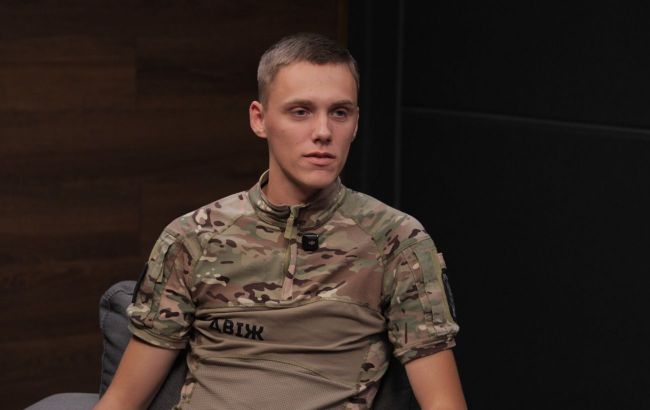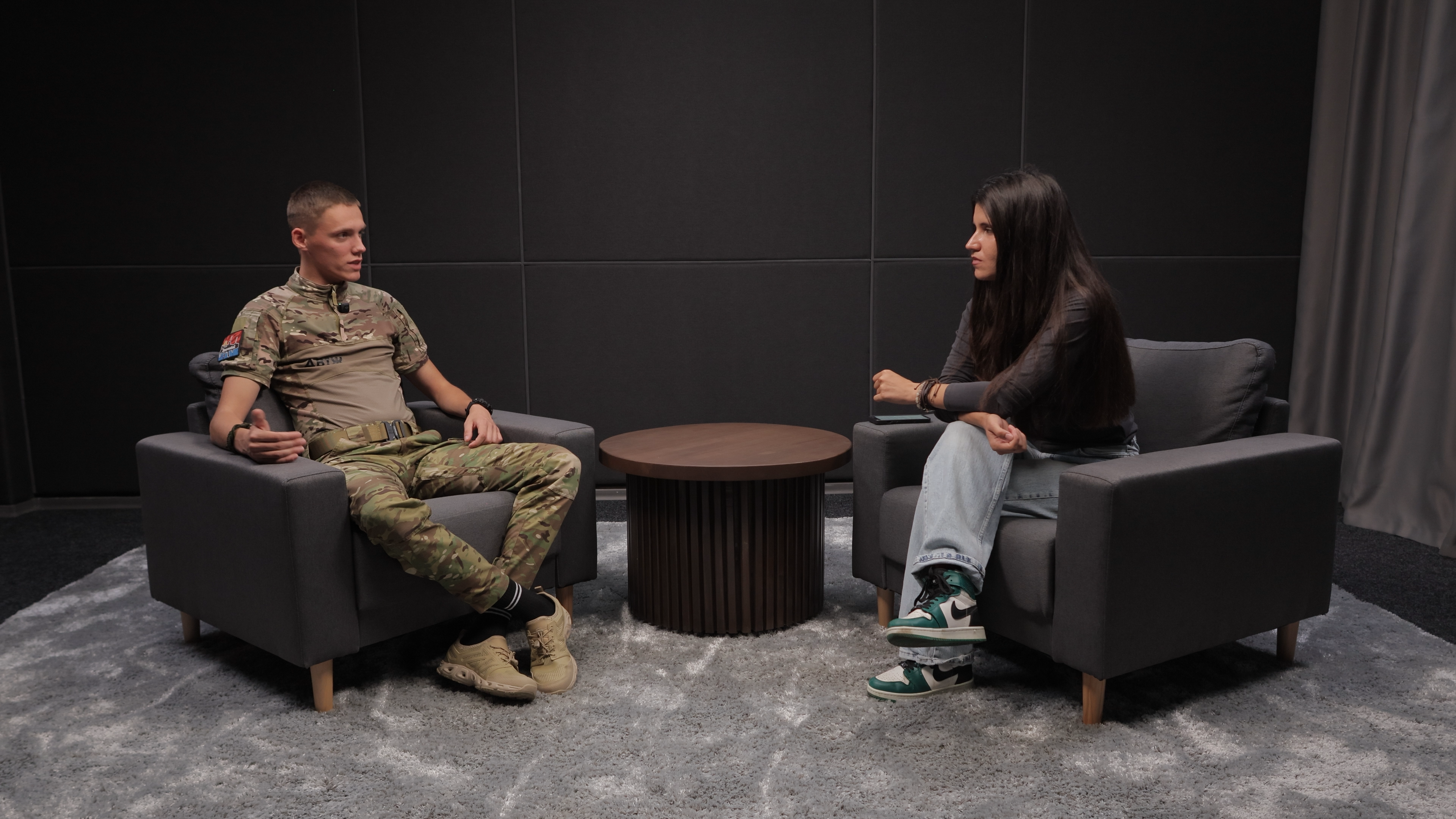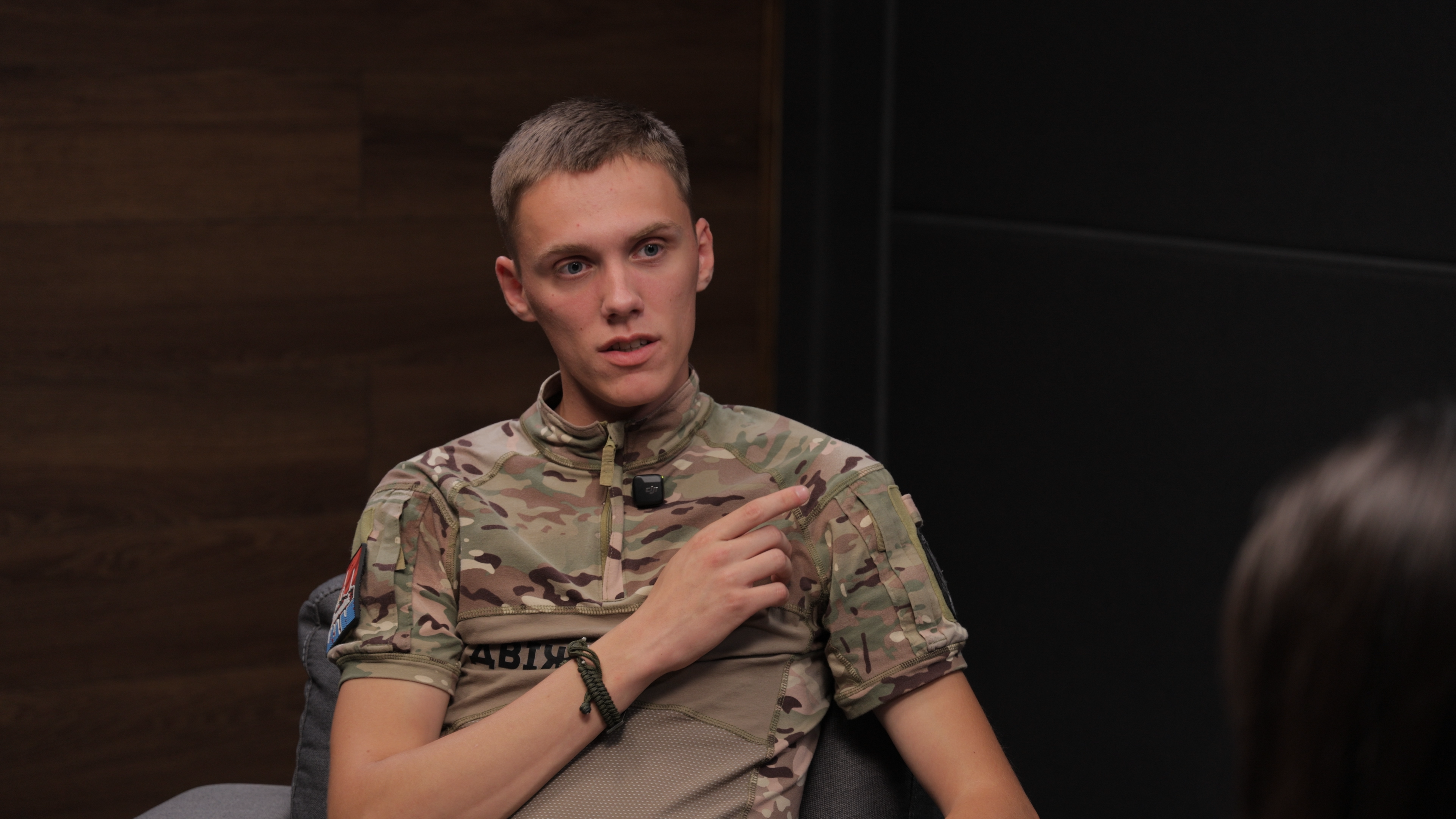Azovstal, Olenivka and three years in captivity: Story of 'Dvizh,' a 23-year-old defender of Mariupol
 'Dvizh' spent three years in captivity (All photos and videos: RBC-Ukraine)
'Dvizh' spent three years in captivity (All photos and videos: RBC-Ukraine)
The story of border guard 'Dvizh,' who went through the battles in Mariupol, saw life in the bunkers of Azovstal, survived captivity, and recalls the day he called his mother for the first time in three years.
He met the full-scale invasion on a boat, guarding Ukraine’s sea borders. At 20, he found himself in the epicenter of the fighting for Mariupol. After the storming of a school and the defense of Azovstal, he was severely wounded and captured — captivity lasted almost three years. This is the story of a young veteran with the call sign 'Dvizh.'
He went through captivity in prisons in the occupied territory, enduring beatings, humiliation, and the Olenivka terror attack. Only five months ago, he returned to Ukraine as part of a prisoner exchange.
He was born in Mariupol — the city of the sea, ports, and salty wind. In his yard, there was always the smell of fish, and from the windows, he saw ships departing on long voyages. In the same city, he graduated from a maritime lyceum. The path seemed clear: merchant fleet, work at sea, ocean routes. But another push lived in his heart. “I was young and hot-headed. Many of my friends were already at war. I wanted to be with them, to take part too,” he explains.
On February 24, 2022, the war caught him not at home. 'Dvizh' was on duty on a boat in the Berdiansk area. “We were guarding the state border of Ukraine. And that’s how it all began.”
Meanwhile, everything in the city was changing. Buses and trolleybuses became barricades; people dug trenches themselves. "The war had been going on since 2014, but there were no defenses around the city. It was very sad." 'Dvizh' saw the difference between how his commanders fought “on paper” and how Azov operated. "Everyone is equal there. You arrive at the position — you’re already brothers-in-arms. And I decided to listen only to them."
During one of the clearings, he met Azov fighters. A commander with the call sign 'Cap' offered him to join. "I’m a mechanic, I don’t know anything, but I’m ready. Teach me," replied 'Dvizh.' 'Cap' promised to teach him, but a week later, he was killed. "He was a very good person. He supported us," he says quietly.

The battle at the school
It was a real battle, one that stayed in his memory forever. It took place in the city center — at a school. 'Dvizh' and his comrades made their way there through streets, courtyards, and rooftops under fire. "We climbed over fences, over roofs. You couldn’t walk along the street — it was all under fire."
When they arrived, they entered the yard. "I see the school. It’s П-shaped. Inside is the yard. Screams, explosions, gunfire, everything’s burning. We run inside. The first thing I see — a body."
In the hall, the guys shout: "Who’s on ammo, who’s on support!” And he stands there, not knowing what to do. “I’m a mechanic. I panic — not from fear, but because I don’t know what to do." There’s no time to explain. Nearby, an Azov fighter steps into the hall and starts shooting back while standing through the window. "I’d only seen that in movies."
Then he understood: if you freeze, it’s over. "I took a position at the window. Started watching, controlling. And I felt — I’m doing something too."
The next day, 'Dvizh' was monitoring the work of an enemy tank, and at one point its gun fired at the place where he was. The explosion blew up the stairs under him. “I felt like I was suffocating. Couldn’t move. I realized that’s it. And then 'Hrinka' and 'Kabina' ran in. They shouted, pulled me out from under the rubble."
They fixed his arm with a piece of baseboard. "'Hrinka' made a splint, tied it up. He was only 18. He carried wounded men weighing 90–100 kilos on his shoulders. And he saved my life," he says.
Azovstal
When 'Dvizh' was evacuated from the school, he could barely stand. His arm was shattered, his head ringing after the explosion, his body numb. The GAZelle truck that was supposed to take them out kept breaking down under shelling. The driver was shot. Snipers fired at the cars, and the roads were under fire.
"I was lying on the ground, thinking about my mother, my sister. It felt like there was no way further. And then, out of the darkness, two Azov vans broke in, covered us with smoke, grabbed us, and pulled us out. That was the second time they saved my life."
They brought him to Azovstal. There, they fixed his arm, put him on IVs, and lifted him to the third floor. "I couldn’t do anything myself. Even to the toilet — the guys carried me." From there began a new life — underground, in the concrete guts of the plant, where the roar of FAB bombs was both an alarm clock and a lullaby.
The bunkers of Azovstal were like labyrinths: long corridors, basements, metal beams, and the smell of rust mixed with medicine and blood. Bombs exploded constantly. Every day felt like the last. "FABs fell so hard the whole body shook. We moved from one shelter to another. Somewhere a huge crater remained, and we already knew: don’t go back there."
People held on to each other. They ate whatever they could find or share. "'Kosmos,' an Azov fighter, re-did my poorly fixed splint and forced me to work my hand. He said, 'Otherwise you'll lose it.' And I, gritting my teeth, worked it."
He remembered one episode forever. There was only one Snickers in the shelter. "'Kosmos' took it, cut it into ten pieces, and gave one to each wounded. It's a small thing, but it’s those moments you never forget. You understand then: we live not because we have something, but because we share the last of it."
Captivity
After leaving Azovstal, a column of buses moved toward Olenivka. They were told: "You'll be in a POW camp under the Geneva Convention. There’ll be the Red Cross, and contact with relatives. Everything will be fine." But when the buses stopped at the gates of the colony, 'Dvizh' saw bars, towers, and barbed wire. "I said, God, what is this? It’s a prison."
They were met harshly. "Come on, throw everything out!" the guards shouted. They cut laces, chains, and threw away personal things. "You step out and feel like you’re no longer a person, just an object." They were placed in barracks so tight that you could stand in the aisle only with one foot. Three or four people slept on one mattress. The air was stale, people got sick, but space wasn’t added.
Food was symbolic. "We saw only humanitarian boxes standing in warehouses. The aid itself — no. Once: one tube of toothpaste for twenty people, ten meters of toilet paper per person. Five razors for six hundred people. That's all."
The worst was the Olenivka terror attack in July 2022. The barracks where dozens of Azov fighters died stood just a few dozen meters from where 'Dvizh' was held. He woke up from the explosion, heard screams, and the smell of burning. "My friends were there. ‘Kosmos,’ who fixed my arm, stayed there forever." Those who tried to run to save their comrades were driven off with threats. For 'Dvizh,' that night became one of the hardest in captivity.

Then came the transfer to Horlivka. They were transported in prison vans — metal cages for criminals. "I thought: I’m 20, and I’m riding in a prison van like a criminal." Upon arrival, they were forced to exit one by one. The first person who ran out was beaten with batons. "You stand in line and hear: two or three men, and it’s your turn. There’s nothing you can do. You just have to take it."
Life in the colony turned into a routine of humiliation. Each prisoner had a tag by his bed: photo, birth year, unit. The photos were taken right after the beatings, with a number. If there was no tag — "come here" and a new search.
Every day began with the Russian anthem. Prisoners were woken before dawn and lined up in the yard. "Sing!" they shouted. Some forgot words out of fear, some froze — they were beaten with batons. Then they were forced to sing Soviet songs: Katyusha, Smuglyanka. "'Third verse, second line!’ they shouted. You stand there, your mind blank. Make a mistake — they beat you. And you no longer know what’s worse — the baton or your brain shutting down."
They were forced to do absurd punishments: "Squat in a circle a hundred times. Stand in the sun without food. Some were wounded, with shrapnel inside — they fainted, and were lifted up and made to sing again."
The interrogations were the worst. He was called into the office. FSB officers, investigators, and guards sat there. They showed photos: his intake at Olenivka, where he’s in a camouflage jacket with a number plate. "'So, Azov guy? Tell us where you were. Who was with you? You still think they’re heroes?' I said, 'Yes. How can I not think heroes are those who saved my life twice?' And then the torture began."
On May 9, 2024, they broke his arm. A blow with a baton to the elbow, sharp pain, and his arm turned blue. "I asked: give me medical help. They said: you’ll get treated in your Ukraine. You’re only to stay alive here." The infirmary refused him. Then a comrade made him a cast from a toothpaste-box cardboard and wrapped it with a bandage. "That was my cast in captivity. That’s how I lived."
Three years passed like one endless day. "In captivity, you lose the sense of time. A year or a month — no difference. You wake up and think of only one thing: to survive."
Return from captivity
Three years later. One evening, he was called to the headquarters. "Put on your uniform," they said. They photographed him in uniform and underwear. He knew what it meant — exchange.
"That’s it, brother, you’re finally on exchange," the guys said. Bus, planes, border. "I sat there thinking — is this really it? From the other side, our guys came in, in multicam, with chevrons. And then I believed we were home."
They wrapped him in a flag. He called his mother for the first time in three years. "Good evening, we’re from Ukraine. Mom, I'm back." Along the road, people stood everywhere: children, the elderly, and even people with disabilities in wheelchairs. "The whole country is welcoming you now," they said. He cried.
The strongest memory in freedom — simple food. "I ate a cutlet for the first time in three years — amazing." Then he took a bun and ryazhenka (a milk drink) in a store. "I love ryazhenka. Like in my past life: before service, I’d buy ryazhenka and buns."
But freedom wasn’t the end of the fight. Treatment and rehabilitation began. Concussion, hematoma. The military commission decided: not fit for service with restrictions. "Either I go to the special operations unit, or nowhere. There’s a war outside — and I’ll stay with a stick?"
Psychologically, it wasn’t easier: PTSD, treatment in a psychiatric hospital. But he found his own way to stay useful. "I have guys from Azov. I donate, support. This isn’t the end. I’m alive — that means I'll do everything for victory."

